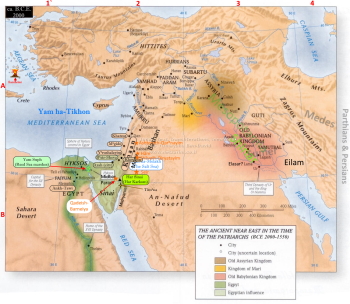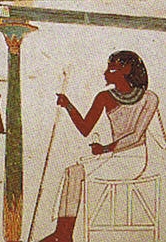
 |

Back in Khë•vᵊr•onꞋ, Kᵊna•anꞋ, Ya•a•qovꞋ-Yi•sᵊr•â•eilꞋ (Yo•seiphꞋ's father) saw that there were granary-distributors![]() in Mi•tzᵊraꞋyim. So Yi•sᵊr•â•eilꞋ asked his sons, "Why are you just sitting around looking at each other? I've gotten word that, down in Mi•tzᵊraꞋyim, their granaries have become distributors.
in Mi•tzᵊraꞋyim. So Yi•sᵊr•â•eilꞋ asked his sons, "Why are you just sitting around looking at each other? I've gotten word that, down in Mi•tzᵊraꞋyim, their granaries have become distributors.![]() Get yourselves down there and purchase some of their granaries' distribution,
Get yourselves down there and purchase some of their granaries' distribution,![]() so that we'll have food to survive and not die of starvation."
so that we'll have food to survive and not die of starvation."
 |
So, because of the famine in ërꞋëtz Kᵊna•anꞋ, 10 of Yo•seiphꞋ's brothers went down to purchase some product from the international granary-distributions![]() in Mi•tzᵊraꞋyim's capital, Ankh-Tawi
in Mi•tzᵊraꞋyim's capital, Ankh-Tawi ![]() . But Yi•sᵊr•â•eilꞋ didn't send Yo•seiphꞋ's little full-brother (by Râ•kheilꞋ), Bin•yâ•minꞋ, with his brothers, for fear that something might happen to him.
. But Yi•sᵊr•â•eilꞋ didn't send Yo•seiphꞋ's little full-brother (by Râ•kheilꞋ), Bin•yâ•minꞋ, with his brothers, for fear that something might happen to him.
Consequently, Bᵊn•eiꞋ-Yi•sᵊrâ•eilꞋ joined the burgeoning caravans flocking to Mi•tzᵊraꞋyim to purchase granary-distributions![]() to feed their ranch-households.
to feed their ranch-households.
So Deputy-Par•ohꞋ Tzâ•phᵊn•atꞋ-Pa•nᵊeiꞋakh,![]() who ruled for Par•ohꞋ Sa-hotep-ka-
who ruled for Par•ohꞋ Sa-hotep-ka-Ra En-yoteph![]() 4th over all of ërꞋëtz Mi•tzᵊraꞋyim, was Yo•seiphꞋ! He was the granary-distributor
4th over all of ërꞋëtz Mi•tzᵊraꞋyim, was Yo•seiphꞋ! He was the granary-distributor![]() to all of the kindred of the land. So, like everyone else, when Yo•seiphꞋ's brothers came before the Deputy-Par•ohꞋ, they bowed down to him like everyone else, faces to the ground. It was like Yo•seiphꞋ had dreamed years earlier—except that his little brother wasn't with them.
to all of the kindred of the land. So, like everyone else, when Yo•seiphꞋ's brothers came before the Deputy-Par•ohꞋ, they bowed down to him like everyone else, faces to the ground. It was like Yo•seiphꞋ had dreamed years earlier—except that his little brother wasn't with them.
 |
| Egyptian white linen mantle draped over shoulder |
Yo•seiphꞋ saw his brothers, and recognized them. But he was dressed as Egyptian royalty, groomed in the Egyptian style and he continued to communicate only in Egyptian, through the appropriate translators,![]() not in Hebrew. He spoke only in a muffled voice to his translators, in fluent ancient Egyptian
not in Hebrew. He spoke only in a muffled voice to his translators, in fluent ancient Egyptian![]() and in a native-Egyptian accent. Moreover, he maintained his demeanor as Deputy-Par•ohꞋ Tzâ•phᵊn•atꞋ-Pa•nᵊeiꞋakh
and in a native-Egyptian accent. Moreover, he maintained his demeanor as Deputy-Par•ohꞋ Tzâ•phᵊn•atꞋ-Pa•nᵊeiꞋakh![]() of the sole world superpower, which had stood for a millennium. All of these things were foreign to his brothers, who hadn't seen Yo•seiphꞋ since he was a young teen. They had no clue that it was their own estranged brother who was Deputy-Par•ohꞋ Tzâ•phᵊn•atꞋ-Pa•nᵊeiꞋakh
of the sole world superpower, which had stood for a millennium. All of these things were foreign to his brothers, who hadn't seen Yo•seiphꞋ since he was a young teen. They had no clue that it was their own estranged brother who was Deputy-Par•ohꞋ Tzâ•phᵊn•atꞋ-Pa•nᵊeiꞋakh![]() over the world's ancient superpower.
over the world's ancient superpower.
Through the translator, Yo•seiphꞋ grilled them harshly. The Egyptian Hebrew-translator faithfully echoed the Deputy-Par•ohꞋ's interrogation. "Where are you from?" he demanded.
"We've come from ërꞋëtz Kᵊna•anꞋ to purchase granary-distribution,"![]() they responded.
they responded.
Remembering his dreams, Yo•seiphꞋ decided to impress on them their complete dependence on him. So he imposed serious fear for their lives on them. Again, the Egyptian Hebrew-translator faithfully reproduced the Deputy-Par•ohꞋ's interrogation. "You are spies who have come to see the naked land!" he charged surlily.
"No a•don•iꞋ," they pleaded. "We've come as your servant-customers, to purchase granary-distributions.![]() We are, all of us, sons of one man. We are amiable men. Your servant-customers have not been spying."
We are, all of us, sons of one man. We are amiable men. Your servant-customers have not been spying."
"No," Yo•seiphꞋ continued to press through his translator. "Your real reason for coming is to spy-out the naked land!"
"Your servant-customers are 12 brothers," they pleaded. "Sons of one man in ërꞋëtz Kᵊna•anꞋ. Look, the youngest is with our father and one isn't anymore."
"We all count 10 here, not 12." Yo•seiphꞋ retorted through his translator. "Like I said, 'You are spies!' So we'll test-prove your story," the translator continued. "As Par•ohꞋ Sa-hotep-ka-Ra En-yoteph![]() 4th lives, you shall never leave here unless your youngest brother appears here before me! Choose among you one of you to go and bring back that youngest brother you claim to have. Until your story checks out, the rest of you will be locked up; else, as Par•ohꞋ Sa-hotep-ka-
4th lives, you shall never leave here unless your youngest brother appears here before me! Choose among you one of you to go and bring back that youngest brother you claim to have. Until your story checks out, the rest of you will be locked up; else, as Par•ohꞋ Sa-hotep-ka-Ra En-yoteph![]() 4th lives, you are spies!" Then Yo•seiphꞋ had them locked up for the standard three days to deliberate and decide which brother to send back to Kᵊna•anꞋ to bring Bin•yâ•minꞋ to Ankh-Tawi.
4th lives, you are spies!" Then Yo•seiphꞋ had them locked up for the standard three days to deliberate and decide which brother to send back to Kᵊna•anꞋ to bring Bin•yâ•minꞋ to Ankh-Tawi.
On the third—judgment—day, Yo•seiphꞋ issued his verdict through his translator: "Do as I direct and you may live; for I revere ha-ël•oh•imꞋ. If you're amiable men, as you've said you are, then one of your brothers shall remain in your cell while the rest of you go and transport your granary-distribution back home to relieve the hunger in your ranch-households. Then bring your youngest brother to me to verify your story and you shall not die." And the brothers, having committed themselves to being amiable men, agreed.
Then the brothers talked among themselves in their cell. "This has happened to us because of our guilt regarding Yo•seiphꞋ," they speculated. "We saw the dire-straits in his nëphꞋësh when he pleaded with us. Yet, we didn't listen to him. That's why this dire-strait has befallen us."
Then Rᵊu•veinꞋ spoke up. "Didn't I warn you not to misstep against the boy? But you wouldn't listen. So now vindication of his blood is also required."
Because Yo•seiphꞋ was speaking ancient Egyptian, and through an interpreter, the brothers were unaware that he understood what they had been saying. But the guilt and remorse surfacing among his brothers caused deep, long repressed, feelings to surge within Yo•seiphꞋ, and he turned his back to them so they would not see the tears welling-up in his eyes.

Optional parental preparation:
ShōrꞋësh ùÑÈáÇø – The hiph•ilꞋ is used in the sense of breaking-down something large into smaller sizes or packages; like a distributor-supplier or department store (îÇùÑÀáÌÄéø). ![]()
Ancient Egyptian of ca. B.C.E. 1760, not Arabic, which didn't become the language of Egypt until almost a millennia later (after the Muslim conquest of Egypt in 639 C.E.). Ancient Egyptian, the spoken language of the hieroglyphics, is no longer spoken by anyone, nor even well understood. Egyptologists guess at how hieroglyphics were pronounced and significant aspects of the ancient Egyptian language remain unknown today and are probably no longer knowable; including pronunciation of hieroglyphs (which is guessed at from pronunciations of counterparts in other languages found on the Rosetta Stone). ![]()
Questions you might anticipate that your child might raise and be prepared to discuss:
What is a distributor (of some product, regional and international; distinguished from the distributor of electric current to spark plugs in combustion gasoline [not diesel] engines, such as in an automobile)?
What is a granary?
What is grooming?
What is a superpower?
What is demeanor?
What does estranged mean?
What is surlily? (adverbial form of surly).
What is vindication?
![]()
 |
 |